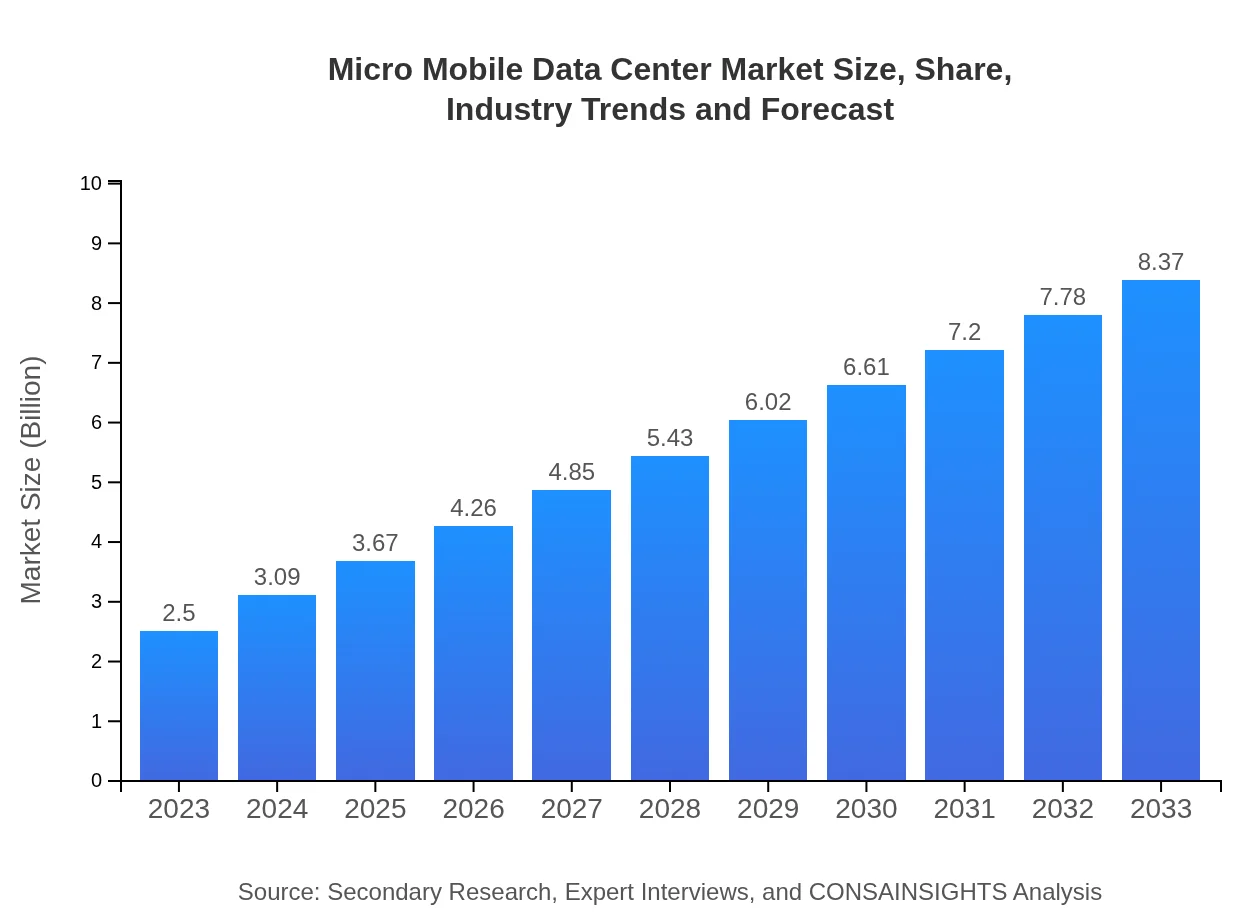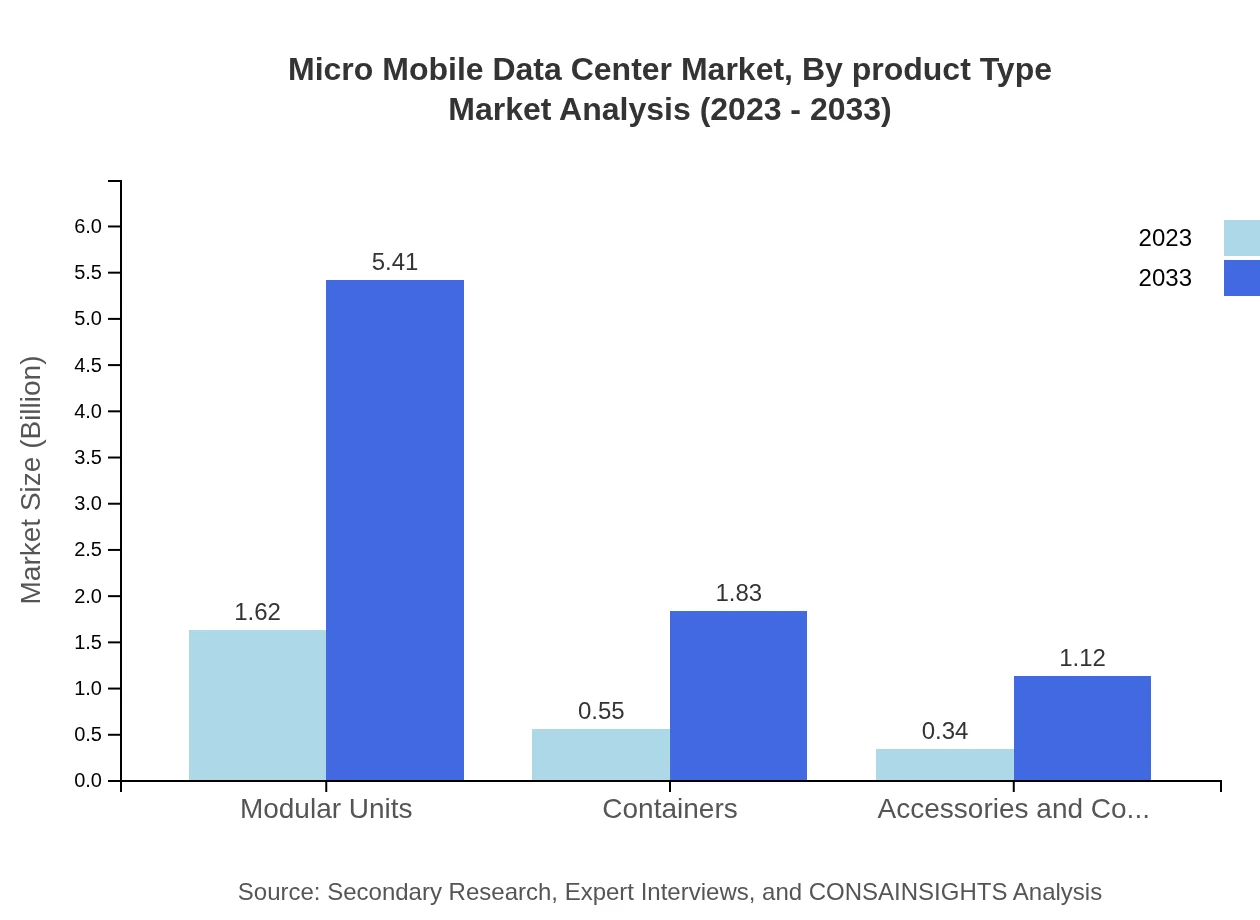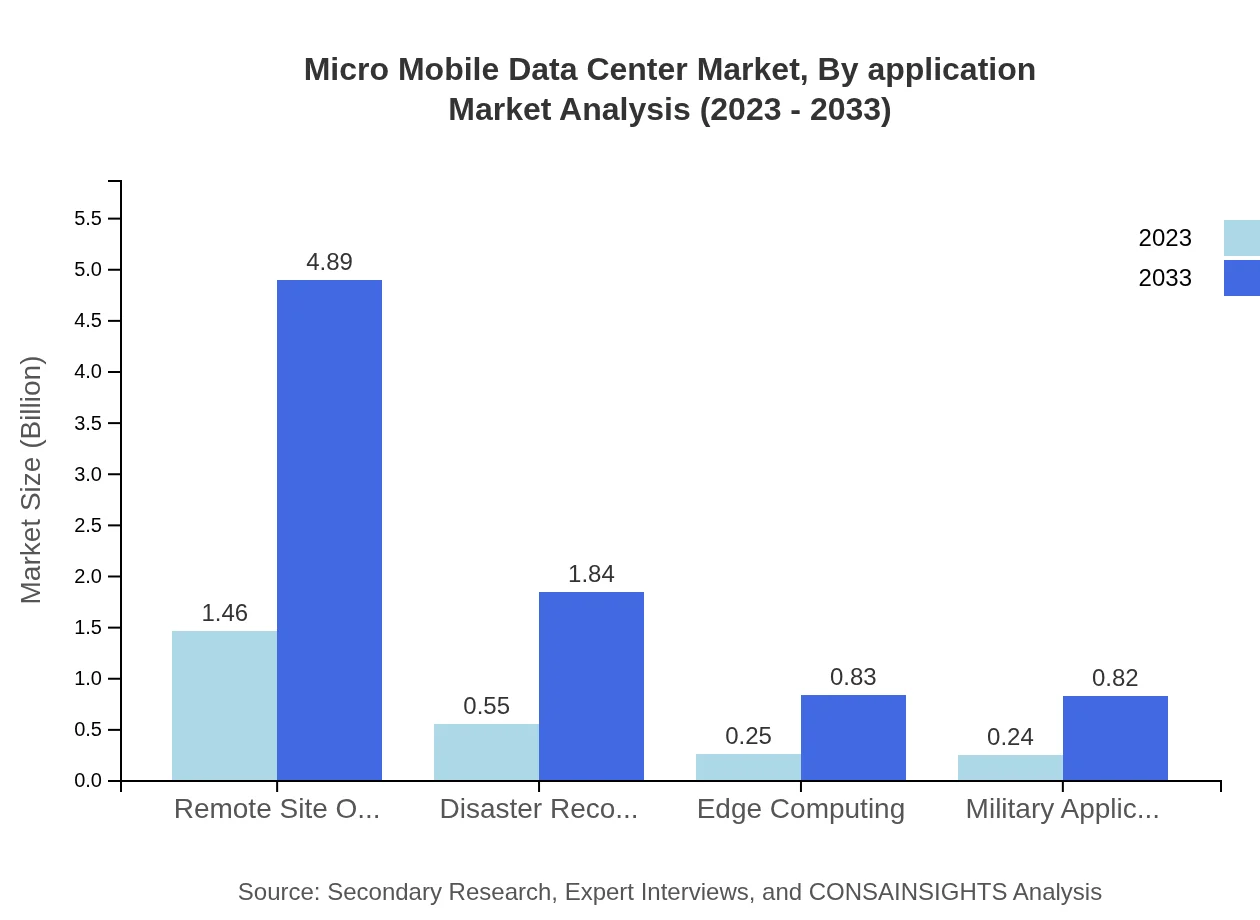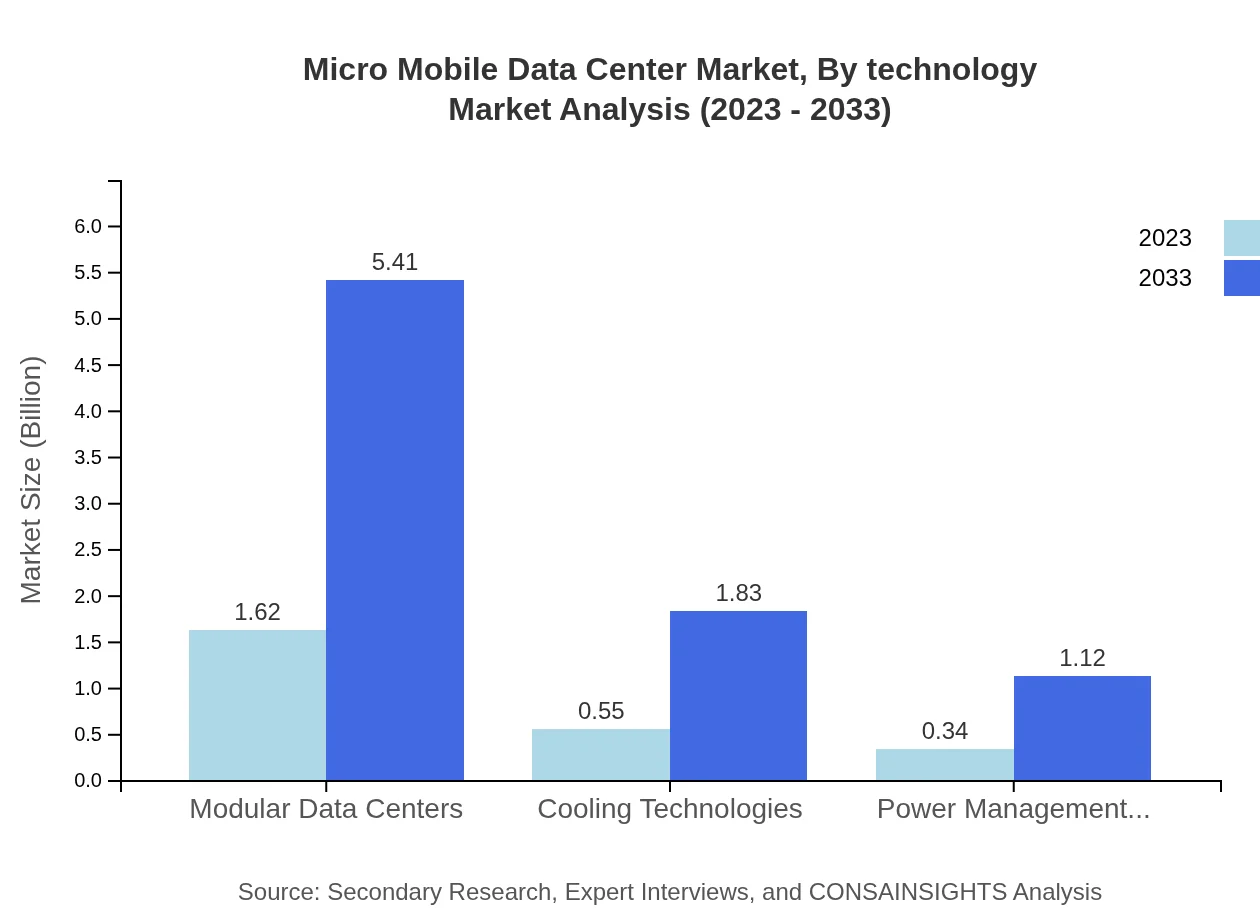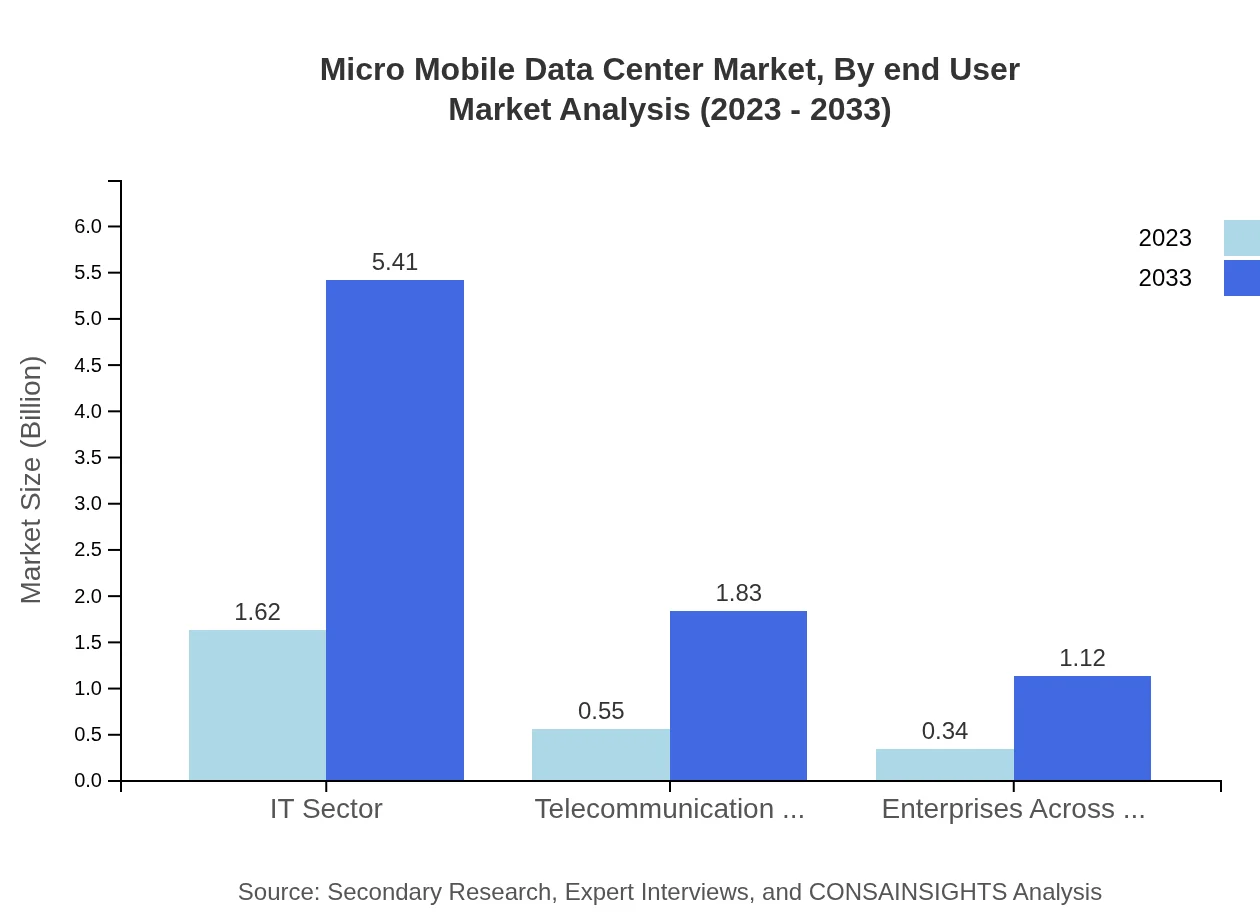Micro Mobile Data Center Market Report
Published Date: 31 January 2026 | Report Code: micro-mobile-data-center
Micro Mobile Data Center Market Size, Share, Industry Trends and Forecast to 2033
This report provides a comprehensive analysis of the Micro Mobile Data Center market, including market size, segmentation, regional insights, technological trends, and future forecasts from 2023 to 2033.
| Metric | Value |
|---|---|
| Study Period | 2023 - 2033 |
| 2023 Market Size | $2.50 Billion |
| CAGR (2023-2033) | 12.3% |
| 2033 Market Size | $8.37 Billion |
| Top Companies | Cisco Systems, Inc., IBM Corporation, Dell Technologies, Vertiv Co., Schneider Electric |
| Last Modified Date | 31 January 2026 |
Micro Mobile Data Center Market Overview
Customize Micro Mobile Data Center Market Report market research report
- ✔ Get in-depth analysis of Micro Mobile Data Center market size, growth, and forecasts.
- ✔ Understand Micro Mobile Data Center's regional dynamics and industry-specific trends.
- ✔ Identify potential applications, end-user demand, and growth segments in Micro Mobile Data Center
What is the Market Size & CAGR of Micro Mobile Data Center market in 2033?
Micro Mobile Data Center Industry Analysis
Micro Mobile Data Center Market Segmentation and Scope
Tell us your focus area and get a customized research report.
Micro Mobile Data Center Market Analysis Report by Region
Europe Micro Mobile Data Center Market Report:
In Europe, the market is set to escalate from $0.69 billion in 2023 to $2.33 billion by 2033. Growing concerns regarding data privacy and compliance requirements are leading enterprises to adopt mobile data centers for enhanced control over data security.Asia Pacific Micro Mobile Data Center Market Report:
The Asia Pacific region is expected to experience immense growth, with the market estimated to rise from $0.52 billion in 2023 to $1.75 billion by 2033. The surge is attributed to rapid urbanization, technological advancements, and an increasing number of data-driven businesses in countries like China and India.North America Micro Mobile Data Center Market Report:
North America dominates the global market, projected to grow from $0.87 billion in 2023 to $2.93 billion by 2033. The strong presence of key market players, high adoption of advanced technologies, and significant investments in data processing capabilities fuel this growth.South America Micro Mobile Data Center Market Report:
In South America, the Micro Mobile Data Center market is anticipated to increase from $0.16 billion in 2023 to $0.54 billion by 2033. Factors contributing to this growth include the rising demand for IT infrastructure and the ongoing digital revolution.Middle East & Africa Micro Mobile Data Center Market Report:
The Middle East and Africa region is also witnessing growth, with market size projected to grow from $0.25 billion in 2023 to $0.83 billion by 2033. The expansion is driven by the need for agile data processing capabilities across various sectors, including military and defense.Tell us your focus area and get a customized research report.
Micro Mobile Data Center Market Analysis By Product Type
The Micro Mobile Data Center market is primarily driven by modular data centers representing $1.62 billion in 2023, growing to $5.41 billion in 2033. This segment holds about 64.68% market share. Containers and accessories also contribute significantly, with notable growth in performance and user adoption.
Micro Mobile Data Center Market Analysis By Application
In 2023, the IT sector leads with a market size of $1.62 billion, projected to grow to $5.41 billion by 2033, holding a 64.68% share. The telecommunications industry and disaster recovery applications are projected to experience substantial growth, reaching $1.83 billion and $1.84 billion, respectively, by 2033.
Micro Mobile Data Center Market Analysis By Technology
Power management technologies and cooling systems represent significant portions of the technology segment. Power management technology is expected to grow from $0.34 billion in 2023 to $1.12 billion by 2033, holding a 13.4% market share.
Micro Mobile Data Center Market Analysis By End User
The military applications sector is a significant end-user, with a projected increase from $0.24 billion in 2023 to $0.82 billion by 2033, covering 9.74% of the market. Enterprises across various sectors are also leaning towards adopting Micro Mobile Data Centers for robust data management.
Micro Mobile Data Center Market Trends and Future Forecast
Tell us your focus area and get a customized research report.
Global Market Leaders and Top Companies in Micro Mobile Data Center Industry
Cisco Systems, Inc.:
Cisco provides cutting-edge networking solutions and modular data center offerings that enhance data management and processing capabilities.IBM Corporation:
IBM is a leader in innovative data center technologies, focused on integrating modular systems with advanced analytics and security features.Dell Technologies:
Dell Technologies offers comprehensive solutions for Micro Mobile Data Centers, focusing on scalable and efficient data management systems.Vertiv Co.:
Vertiv specializes in critical digital infrastructure, including innovative cooling and power solutions that optimize Micro Mobile Data Center performance.Schneider Electric:
Schneider Electric delivers integrated solutions for Micro Mobile Data Centers, emphasizing sustainability and energy efficiency across operations.We're grateful to work with incredible clients.









FAQs
What is the market size of micro Mobile Data Center?
The micro-mobile data center market is projected to reach $2.5 billion by 2033, growing at a CAGR of 12.3% from 2023. This growth indicates a strong demand for flexible data center solutions in various industries.
What are the key market players or companies in this micro Mobile Data Center industry?
Key players in the micro-mobile data center industry include companies like Schneider Electric, Vertiv, and Huawei. These firms focus on providing innovative solutions that enhance efficiency and scalability in data management.
What are the primary factors driving the growth in the micro Mobile Data Center industry?
The growth of the micro-mobile data center industry is driven by increasing demand for data processing due to IoT and cloud computing, the need for disaster recovery solutions, and the shift towards edge computing technologies.
Which region is the fastest Growing in the micro Mobile Data Center?
The North American region is the fastest-growing market for micro-mobile data centers, projected to escalate from $0.87 billion in 2023 to $2.93 billion by 2033. This growth is supported by advancements in telecommunications.
Does ConsaInsights provide customized market report data for the micro Mobile Data Center industry?
Yes, ConsaInsights offers customized market reports tailored to specific needs in the micro-mobile data center industry, ensuring you receive relevant data and insights for informed decision-making.
What deliverables can I expect from this micro Mobile Data Center market research project?
From the micro-mobile data center market research project, expect comprehensive market analysis, segment breakdowns, competitive landscape evaluations, historical trends, and future forecasts for informed strategic planning.
What are the market trends of micro Mobile Data Center?
Current trends in the micro-mobile data center market include increased reliance on modular data centers, growth in edge computing solutions, and advancements in power and cooling technologies to enhance operational efficiency.

